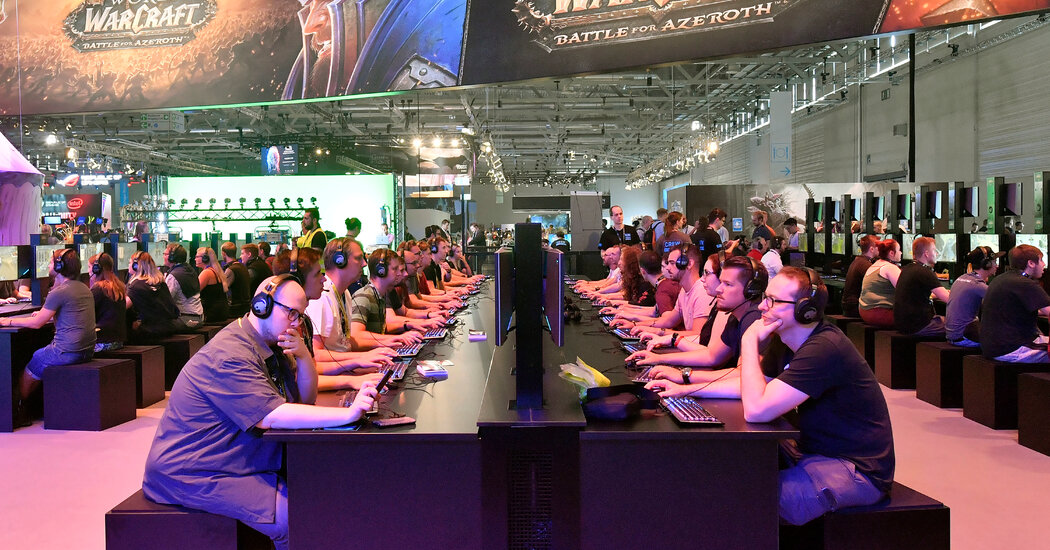U.K. antitrust regulators on Wednesday blocked Microsoft’s plans to acquire video game giant Activision Blizzard for $69 billion, a significant hurdle for what would become the largest consumer technology acquisition since AOL bought Time Warner two decades ago.
Britain’s Competition and Markets Authority said in a statement that Microsoft’s settlement proposal “failed to effectively address concerns in the cloud gaming sector.” Cloud gaming is an emerging technology that allows people to stream games to their devices, making hardware such as game consoles obsolete.
“Microsoft already has a powerful position and advantage over other competitors in cloud gaming and this deal would reinforce that advantage, allowing it to undercut new and innovative competitors,” said Martin Coleman, the chair of a panel that conducted a study for the CMA. , a statement said.
The announcement supported an effort by the Federal Trade Commission to block the acquisition. Microsoft had hoped to undermine a challenge to the deal by FTC chair Lina Khan by reaching settlements with the UK regulator and its counterpart in the European Union.
The decision in Britain is a red flag for big tech companies trying to make big deals despite increasing government scrutiny. Legislators and regulators have threatened numerous measures in recent years to rein in companies like Microsoft, Amazon, Apple, Google and Facebook’s owner Meta, which they say exert too much influence on culture, communication and commerce.
Microsoft said it will appeal the ruling.
“We are particularly disappointed that after much deliberation, this decision appears to reflect a lack of understanding of this market and how the relevant cloud technology works,” Microsoft president Brad Smith said in a statement.
Activision, the publisher of blockbuster games like Call of Duty, said it would work “aggressively” with Microsoft to overturn the ruling.
“If the CMA’s decision stands, it would hamper investment, competition and job creation across the UK games industry,” said Bobby Kotick, CEO of Activision.
The move is a boon to Ms. Khan, the chairman of the FTC, who has made difficult mergers a central part of her effort to rein in the power of big tech companies. After unsuccessfully trying to dissuade Meta from buying a virtual reality start-up, the agency’s case against the giant Microsoft deal is the most prominent remaining challenge to consolidation in the technology industry.
“When we look at the entire portfolio of fusion-related work they’re doing now, it’s extremely important,” said William E. Kovacic, a former president of the agency. An FTC spokesperson did not immediately respond to a request for comment.
Microsoft announced the deal to buy Activision early last year, hoping to combine Microsoft’s Xbox console and video game subscription service with Activision’s blockbuster games like Call of Duty, World of Warcraft and Candy Crush.
At the time, Activision was reeling from a California lawsuit accusing it of promoting a toxic, sexist work culture and Mr. Kotick was facing calls to resign.
For more than a year, the debate over the deal has largely revolved around what would happen to the hundreds of millions of people who play Activision’s games. The company most vocally opposed to the deal was Sony, which is making the PlayStation console a competitor to Microsoft’s Xbox. Sony argued that fans of Call of Duty and other Activision titles who can currently play the games on the Xbox or PlayStation would be forced to use Microsoft’s consoles and services exclusively.
Sony did not immediately respond to a request for comment on the ruling.
Microsoft said it wouldn’t limit Call of Duty to the Xbox and that the acquisition would actually give more people access to the games. It focused on reaching settlements with regulators outside the United States that would allow the deal to go ahead under certain conditions. It also offered game platforms guaranteed access to Call of Duty in an effort to show that it would not restrict the popular game on other consoles.
The UK regulator initially said in February that the deal would hurt competition for game consoles like the PlayStation and the burgeoning cloud gaming industry, which uses the power of remote data centers to stream a game to a device like an iPhone or computer. But in late March, it turned around, saying it no longer believed the deal posed a threat to Sony, which seemed to put Microsoft in a strong position.
Instead, the CMA focused on the cloud gaming market, which has only been around for a few years, focusing on the possibility that cloud gaming could explode in popularity, eventually reaching $14 billion globally and $1.3 billion in Britain. would be worth by 2026.
“The cloud means UK gamers don’t have to buy expensive games consoles and PCs and they have a lot more flexibility and choice in how they play,” the CMA wrote in its ruling on Wednesday. “Allowing Microsoft to take such a strong foothold in the cloud gaming market as it begins to grow rapidly threatens to undermine the innovation critical to the development of these opportunities.”
In recent months, Microsoft has signed a number of deals promising Activision’s games will be playable on cloud streaming platforms such as Nvidia’s GeForce Now streaming service for 10 years. But the CMA said those solutions didn’t adequately cover cloud business models.
“This is a major blow to closing the deal,” said Piers Harding-Rolls, a gaming researcher at London-based analytics firm Ampere Analysis. “Inevitably, this will slow things down and affect Xbox’s commercial plans.”
Actvision’s stock fell more than 10 percent in premarket trading. Shares of Microsoft, which traded higher after it reported stronger-than-expected earnings on Tuesday, were up about 8 percent.
Karen Weise contributed reporting from Seattle, and Adam Satariano from London.

